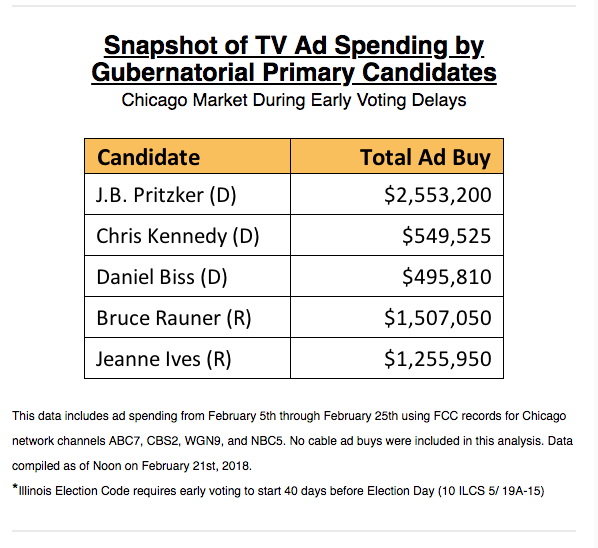Early Voting Delays, Blago Tapes Change Last-Minute Pitches by Gov. Candidates

- Early Voting delays between February 8th and 21st created an opportunity for campaigns to air television ads capitalizing on the latest political news before voters could begin heading to the polls.
- New poll results, the release of damaging tapes, and subsequent ads were factors as the race tightened among leading gubernatorial candidates.
- In a snapshot of major Chicago markets, J.B. Pritzker spent twice as much as Governor Rauner, and four times as much as any other Democratic candidate since Early Voting was delayed in early February.
- GOP candidate Jeanne Ives spent nearly as much on Chicago TV network ads as incumbent Bruce Rauner during that time.
|
|

| ICPR asked each campaign how its voter outreach, including ad spending, was changing in light of Early Voting delays from February 8th to February 21st. The Pritzker and Kennedy campaigns each stated that the delays were not altering their strategies, and that they were committed to reaching all voters. Biss spokesman Tom Elliott echoed a similar message, and added that the campaign’s main focus was on the wider Early Voting roll-out scheduled to start March 5th. However, Biss for Illinois purchased $279,000 in Chicago network television spots on February 6th, the day after Early Voting was to be delayed. When asked about the timing of the purchase, Elliott explained, “Since the new polls and second Blagojevich tape, the campaign has seen a surge in fundraising from people looking for a middle-class candidate. That’s where the correlation is.” Regardless of the impetus, recent developments have allowed the Biss campaign to seize the moment and make the most of an apparent turn in public opinion. Data shows that fundraising totaled $865,000 for the Biss campaign since early February, a considerable haul for the candidate. The chart above summarizes network TV ad spending for Gubernatorial candidates in the Chicago media market throughout the two weeks of Early Voting delays from February 8th to 21st. In this snapshot, J.B Pritzker continues to significantly outpace all other candidates, with about twice as much spending as Governor Rauner. Kennedy comes in second, with Biss trailing closely behind. Notably, GOP candidate Rep. Jeanne Ives spent nearly as much on Chicago TV advertising on major stations as her Primary Election competitor, incumbent Governor Bruce Rauner. Ives’ fundraising did not see a significant increase during the early voting period, but she did receive $2.5 million from GOP mega-donor Richard Uihlein in January. Rauner’s ads have been focused on the Blagojevich tapes, putting pressure on Pritzker to respond, and giving an opening to Biss and Kennedy. The Rauner and Ives campaigns could not be reached for comment. |

Notably, Pritzker’s ad buy was used to air an ad featuring the endorsement of many statewide elected officials, including Comptroller Susana Mendoza, U.S. Senator Tammy Duckworth, and Secretary of State Jesse White. The ad was seen as an attempt at damage control after Pritzker’s controversial statements on the Blagojevich tapes were featured in many statewide ads.
Senator Biss’s advertisements have mostly stuck to his message of the “Middle Class Governor,” while Kennedy has sharpened his focus on the controversial tapes between Pritzker and Blagojevich. Recently, Kennedy has aired an ad featuring former Illinois Senate President Emil Jones, who pans Pritzker for his comments involving race.
While we have to wait until the Primary Election on March 20th to know how these delays impact key races, one thing is clear: Voters in the Chicago area were inundated with political messaging while they waited to cast their ballots in this important election.
Back
